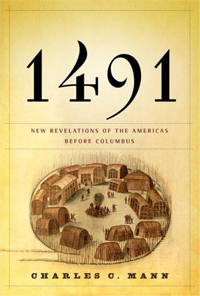 W
W1491: New Revelations of the Americas Before Columbus is a 2005 non-fiction book by American author and science writer Charles C. Mann about the pre-Columbian Americas. It was the 2006 winner of the National Academies Communication Award for best creative work that helps the public understanding of topics in science, engineering or medicine.
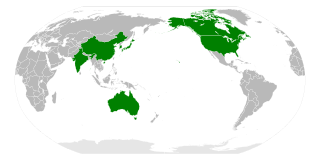 W
WThe Asia-Pacific Partnership on Clean Development and Climate, also known as APP, was an international, voluntary, public-private partnership among Australia, Canada, India, Japan, the People's Republic of China, South Korea, and the United States announced July 28, 2005 at an Association of South East Asian Nations (ASEAN) Regional Forum meeting and launched on January 12, 2006 at the Partnership's inaugural Ministerial meeting in Sydney. As of 5 April 2011, the Partnership formally concluded although a number of individual projects continue. The conclusion of the APP and cancellation of many of its projects attracted almost no media comment.
 W
WCollapse: How Societies Choose to Fail or Succeed is a 2005 book by academic and popular science author Jared Diamond, in which the author first defines collapse: "a drastic decrease in human population size and/or political/economic/social complexity, over a considerable area, for an extended time." He then reviews the causes of historical and pre-historical instances of societal collapse—particularly those involving significant influences from environmental changes, the effects of climate change, hostile neighbors, trade partners, and the society's response to the foregoing four challenges—and considers the success or failure different societies have had in coping with such threats.
 W
WThe Energy Policy Act of 2005 is a federal law signed by President George W. Bush on August 8, 2005, at Sandia National Laboratories in Albuquerque, New Mexico. The act, described by proponents as an attempt to combat growing energy problems, changed US energy policy by providing tax incentives and loan guarantees for energy production of various types. The law also exempted hydraulic fracturing fluids from regulation under several environmental laws, and it repealed the Public Utility Holding Company Act of 1935, effective February 2006.
 W
WThe International Whaling Commission meeting in 2005 was held in Ulsan, South Korea from 20 June–24 June 2005. This meeting saw discussion and vote upon several particularly divisive matters. Notable among them were three defeated Japanese proposals:A proposal to have secret ballot voting. Many watchers of the Commission interpreted this proposal as designed to allow Japan's protégé member states to vote in a way that was less transparent. A proposal to re-institute commercial whaling, which would have required a three quarters majority to carry the vote, was defeated 29 votes to 23 against A proposal to remove a decade old Southern Ocean whale sanctuary, which was defeated 30 votes against 25
 W
WThe Jilin chemical plant explosions were a series of explosions which occurred on November 13, 2005, in the No.102 Petrochemical Plant in Jilin City, Jilin Province, China, over the period of an hour. The explosions killed six, injured dozens, and caused the evacuation of tens of thousands of residents.
 W
WThe Kyoto Protocol was an international treaty which extended the 1992 United Nations Framework Convention on Climate Change (UNFCCC) that commits state parties to reduce greenhouse gas emissions, based on the scientific consensus that (part one) global warming is occurring and (part two) that human-made CO2 emissions are driving it. The Kyoto Protocol was adopted in Kyoto, Japan, on 11 December 1997 and entered into force on 16 February 2005. There were 192 parties (Canada withdrew from the protocol, effective December 2012) to the Protocol in 2020.
 W
WLast Child in the Woods: Saving Our Children From Nature-Deficit Disorder is a 2005 book by author Richard Louv that documents decreased exposure of children to nature in American society and how this "nature-deficit disorder" harms children and society. The book examines research and concludes that direct exposure to nature is essential for healthy childhood development and for the physical and emotional health of children and adults. The author also suggests solutions to the problems he describes. A revised and expanded edition was published in 2008.
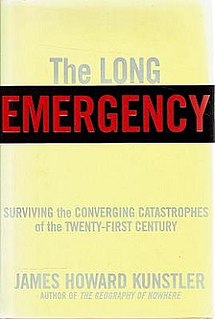 W
WThe Long Emergency: Surviving the Converging Catastrophes of the Twenty-first Century is a book by James Howard Kunstler exploring the consequences of a world oil production peak, coinciding with the forces of climate change, resurgent diseases, water scarcity, global economic instability and warfare to cause major trouble for future generations.
 W
WThe 2005 Malaysian haze was an air pollution crisis caused primarily by fires in neighbouring Indonesia. In August 2005, haze spread across Malaysia from forest fires on the Indonesian island of Sumatra, leading to air quality reaching hazardous levels in certain states and the capital city, Kuala Lumpur. The Malaysian government declared states of emergency in affected regions, closed schools and held crisis talks with Indonesian officials. Farmers regularly burn scrub and forest to clear land during the dry season for agricultural purposes. The 2005 haze was at the time the worst to hit Malaysia since 1997.
 W
WThe Millennium Ecosystem Assessment (MA) is a major assessment of the human impact on the environment, called for by the United Nations Secretary-General Kofi Annan in 2000, launched in 2001 and published in 2005 with more than $14 million of grants. It popularized the term ecosystem services, the benefits gained by humans from ecosystems.
 W
WMontréal v 2952-1366 Québec Inc, [2005] 3 S.C.R. 141, 2005 SCC 62 is a leading Supreme Court of Canada decision on freedom of expression under section 2(b) of the Canadian Charter of Rights and Freedoms. The Court held that a strip club has no constitutional right to broadcast music into public streets in order to attract customers. The decision stated that location of the expression was a factor in considering if there was a violation.
 W
WThe Murphy Oil USA refinery spill was an oil spill that resulted from the failure of a storage tank at the Murphy Oil USA petroleum refinery in the residential areas of Chalmette and Meraux, Louisiana, United States, on August 30, 2005, the day after Hurricane Katrina made landfall on the U.S. Gulf Coast.
 W
WR (Jackson) v Attorney General [2005] UKHL 56 is a House of Lords case noted for containing obiter comments by the Judiciary acting in their official capacity suggesting that there may be limits to parliamentary sovereignty, the orthodox position being that it is unlimited in the United Kingdom.
 W
WThe 2005 United Nations Climate Change Conference took place between November 28 and December 9, 2005, in Montreal, Quebec, Canada. The conference included the 11th Conference of the Parties (COP11) to the United Nations Framework Convention on Climate Change (UNFCCC), and was the first Meeting of the Parties (MOP1) to the Kyoto Protocol since their initial meeting in Kyoto in 1997.
 W
WVoices from the Gathering Storm: The Web of Ecological-Societal Crisis is a 2005 non-fiction book that was published by Word Association Publishers and edited by Joseph Arcos, Mary Argus and Frederick DiCarlo.
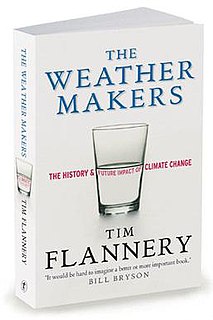 W
WThe Weather Makers: The History and Future Impact of Climate Change is a 2005 book by Tim Flannery.
 W
WThe Memorandum of Understanding (MoU) concerning Conservation Measures for the West African Populations of the African Elephant is a Multilateral Environmental Memorandum of Understanding and was launched under the auspices of the Convention on Migratory Species of Wild Animals (CMS), also known as the Bonn Convention, on 22 November 2005, in close cooperation with the African Elephant Specialist Group (AfESG) of the IUCN Species Survival Commission (IUCN/SSC). The MoU covers thirteen range States, all of which have signed the MoU.
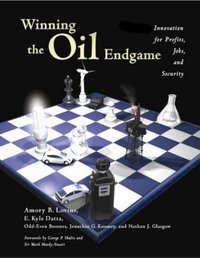 W
WWinning the Oil Endgame: Innovation for Profits, Jobs and Security is a 2005 book by Amory B. Lovins, E. Kyle Datta, Odd-Even Bustnes, Jonathan G. Koomey, and Nathan J. Glasgow, published by the Rocky Mountain Institute. It presents an independent, transdisciplinary analysis of four ways to reduce petroleum dependence in the United States:Using oil more efficiently, through smarter technologies that wring more services from less oil (pp. 29–102). Substituting for petroleum fuels other liquids made from biomass or wastes (pp. 103–111). Substituting saved natural gas for oil in uses where they’re interchangeable, such as furnaces and boilers (pp. 111–122). Replacing oil with hydrogen made from non-oil resources (pp. 228–242).